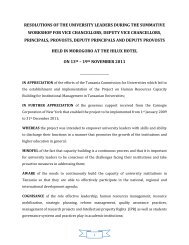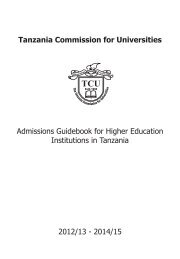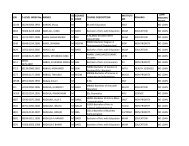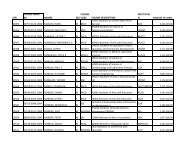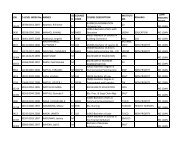Handbook for Quality Assurance in Higher Education The ... - TCU
Handbook for Quality Assurance in Higher Education The ... - TCU
Handbook for Quality Assurance in Higher Education The ... - TCU
You also want an ePaper? Increase the reach of your titles
YUMPU automatically turns print PDFs into web optimized ePapers that Google loves.
1. (n) the embodiment of the essential nature of a person, collective, object, action, process<br />
or organisation.<br />
2. (adj) high grade or high status (as <strong>in</strong> a quality per<strong>for</strong>mance).<br />
3. a shorthand, <strong>in</strong> higher education, <strong>for</strong> quality evaluation processes.<br />
QUALITY ASSESSMENT: See assessment<br />
QUALITY ASSURANCE: See assurance<br />
QUALITY AUDIT: See audit<br />
QUALITY CONTROL: <strong>Quality</strong> control is a mechanism <strong>for</strong> ensur<strong>in</strong>g that an output (product or<br />
service) con<strong>for</strong>ms to a predeterm<strong>in</strong>ed specification.<br />
QUALITY EVALUATION: See evaluation<br />
QUALITY GUIDELINES: See guidel<strong>in</strong>es<br />
QUALITY MONITORING: See external quality monitor<strong>in</strong>g<br />
QUALITY REVIEW: See review<br />
QUALITY VALIDATION: See accreditation; validation<br />
R<br />
RANKING: Rank<strong>in</strong>g is a term used to refer to the rat<strong>in</strong>g and order<strong>in</strong>g of higher education<br />
<strong>in</strong>stitutions or programs of study based on various criteria.<br />
RE-ACCREDITATION: Re-accreditation is the re-establishment or re-statement (usually on a fixed<br />
periodic cycle) of the status, legitimacy or appropriateness of an <strong>in</strong>stitution, program (i.e.<br />
composite of modules) or module of study or of the professional recognition of an <strong>in</strong>dividual.<br />
RECIPROCITY: Reciprocity is the acceptance by one agency of the outcomes of a quality process<br />
conducted by another agency.<br />
RECOGNITION: Recognition is the <strong>for</strong>mal acknowledgement of the status of an organisation,<br />
<strong>in</strong>stitution or program.<br />
RECOGNITION OF PRIOR LEARNING: Recognition of prior learn<strong>in</strong>g is <strong>for</strong>mal acknowledgement<br />
of previous learn<strong>in</strong>g, from <strong>in</strong><strong>for</strong>mal as well as <strong>for</strong>mal learn<strong>in</strong>g situations.<br />
REGIONAL ACCREDITATION: Regional accreditation is recognition of an <strong>in</strong>stitution with<strong>in</strong> a regional<br />
context: it is much the same as national accreditation but is not restricted to national<br />
boundaries.<br />
REGULATORY BODY: A regulatory body, <strong>in</strong> the context of higher education, is an external<br />
organisation that has been empowered by legislation to oversee and control the educational<br />
process and outputs germane to it.<br />
REPORT: Report (n.) is the documented outcome or results of an evaluation process.<br />
RESEARCH ASSESSMENT EXERCISE (RAE): <strong>The</strong> RAE is a process, <strong>in</strong> the UK and Hong Kong, that<br />
assesses the quality of research to enable the higher education fund<strong>in</strong>g bodies to distribute<br />
public funds on the basis of research quality rat<strong>in</strong>gs.<br />
REVIEW:<br />
1. Review is generic term <strong>for</strong> any process that explores the quality of higher education.<br />
2. Review refers to explorations of quality that do not result <strong>in</strong> judgements or decisions.<br />
Review team: <strong>The</strong> review team is the group of people undertak<strong>in</strong>g a quality monitor<strong>in</strong>g or<br />
evaluation process.<br />
Guidel<strong>in</strong>es <strong>for</strong> Self Assessment<br />
55<br />
IUCEA/ CHE/ NCHE/ <strong>TCU</strong>/ DAAD



